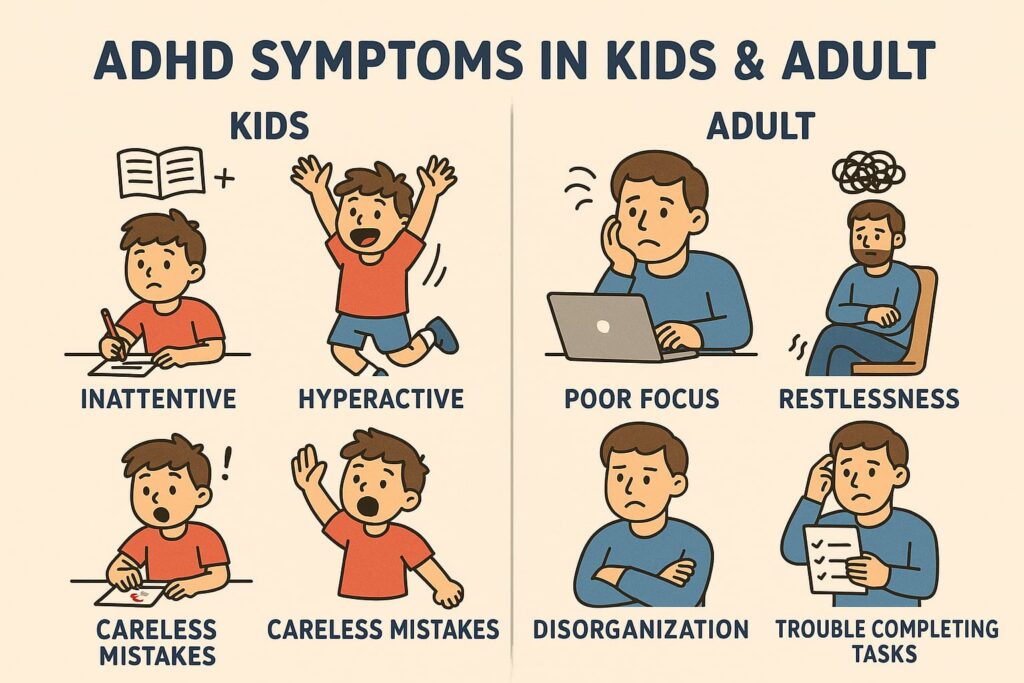Getting an adult ADHD diagnosis in Ontario involves scheduling a comprehensive assessment with a qualified healthcare professional, such as a psychologist, psychiatrist, or nurse practitioner. The key to obtaining an official diagnosis is undergoing a detailed evaluation that includes self-reported symptoms, medical history, and often collateral information from close contacts. This process aims to differentiate ADHD from other conditions that might present similar symptoms.
Assessments can be done in person or online, and there are specialized centers across Ontario offering focused services for adult ADHD. Access to these services varies, but many emphasize timely appointments and provide support for both diagnosis and treatment planning. Knowing where to find reliable providers and understanding the steps involved can help individuals navigate the system with confidence.
Adult ADHD Diagnosis Process in Ontario
A big question is how to get adult adhd diagnosis ontario ? Getting diagnosed with adult ADHD in Ontario involves several clear steps. These include identifying symptoms, finding the right healthcare professional, following referral and assessment protocols, and using specific diagnostic tools. Each stage is designed to ensure an accurate diagnosis and appropriate support.
Recognizing Symptoms and When to Seek Help
Adults with ADHD often experience persistent issues with focus, organization, impulsivity, and time management. Symptoms may also include restlessness, difficulty completing tasks, and frequent forgetfulness. Those noticing these challenges affecting daily functioning, work, or relationships should consider an evaluation.
ADHD symptoms can sometimes overlap with anxiety, depression, or other conditions. Early recognition and seeking professional guidance help differentiate these issues. It is important to seek assessment if symptoms have been ongoing since childhood even if diagnosis was missed earlier.
Finding a Qualified ADHD Specialist
In Ontario, diagnosis is typically made by specialists such as psychiatrists, psychologists, or experienced nurse practitioners trained in adult ADHD assessment. The Adult ADHD Centre and private mental health clinics often offer comprehensive services.
Patients can self-refer to some services or get referrals from primary care providers. Choosing a clinician with experience in ADHD and access to standardized assessment methods is crucial for accurate diagnosis.
Referral and Assessment Procedures
Referral pathways depend on the healthcare setting. Public assessments may require a referral from a family doctor to a psychiatrist or psychologist. Private clinics often allow direct booking but at a cost.
Once referred, the assessment involves an initial intake interview, review of medical and developmental history, and symptom evaluation. The process can take multiple sessions to gather detailed information from the individual and sometimes from family or others.
Typical ADHD Diagnostic Tools Used
Clinicians use standardized tools aligned with DSM-5 criteria to diagnose adult ADHD. Commonly used tools include:
- Adult ADHD Self-Report Scale (ASRS): A questionnaire assessing symptom frequency.
- Clinical interviews: Structured and semi-structured to explore symptom history.
- Collateral reports: Input from family or close contacts when available.
- Cognitive tests: Sometimes used to evaluate attention and executive function.
These tools provide a comprehensive picture necessary for an accurate diagnosis and tailored treatment plan.
Next Steps After Your ADHD Diagnosis
After receiving an ADHD diagnosis in Ontario, several specific actions help manage symptoms and access support. These include choosing treatment paths, finding local resources, and understanding financial factors related to care and assessment.
Understanding Your Treatment Options
Treatment for adult ADHD usually involves medication, therapy, or a combination of both. Stimulant medications like methylphenidate and amphetamines are common, but non-stimulant options exist for people who cannot tolerate stimulants.
Cognitive-behavioral therapy (CBT) and coaching focus on practical skills such as time management, organization, and coping strategies. These approaches help reduce the impact of symptoms on daily life.
It is important to work with healthcare professionals, like psychiatrists or nurse practitioners, who specialize in ADHD to tailor treatment. Regular follow-up appointments allow adjustments to medication and therapy plans.
Accessing Support Services in Ontario
Ontario offers multiple support services for adults with ADHD. Community health centres and specialized clinics, including the Adult ADHD Centre, provide assessments, treatment, and ongoing support.
Peer support groups and educational workshops help with shared experiences and practical strategies. Many services are available through provincial health plans or nonprofit organizations.
Online resources and telehealth options have grown, increasing accessibility, especially in remote areas. Referrals from family physicians are often required to access specialized ADHD services in public healthcare.
Cost, Insurance, and Wait Times
Public assessments for ADHD in Ontario are typically covered by the Ontario Health Insurance Plan (OHIP), but wait times can range from several weeks to months depending on demand and location.
Private assessments and treatment can be faster but may cost between $500 and $1500 for a diagnosis. Some extended health insurance plans cover part of these costs.
Medication prescribed by a doctor may be covered under provincial drug plans like OHIP+ (for under 25) or Trillium Drug Program for eligible adults. Understanding insurance coverage and eligibility helps reduce out-of-pocket expenses.



